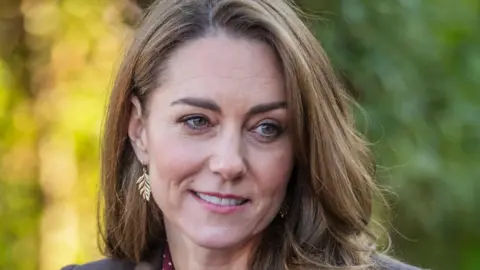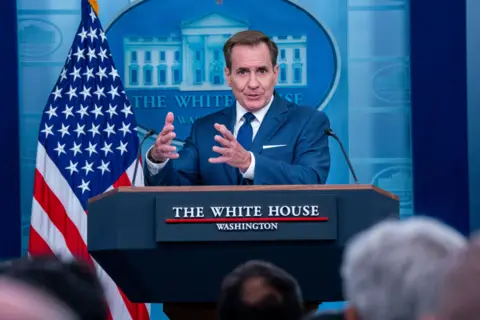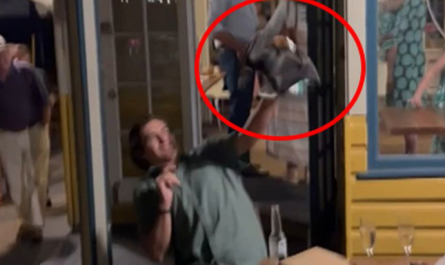
Six Russian agencies and individuals accused of being part of a disinformation network face sanctions from the UK government.
The so-called Doppelganger group had been linked earlier this year to spreading false rumours about the Princess of Wales.
The Foreign Office warned of a “vast malign online network” intended to cause disruption and confusion, distributing fake news and undermining democracy.
The Doppelganger group are accused of trying to incite division within countries supporting Ukraine in the war against Russia.
In March this year the group had been claimed as amplifying a wave of rumours and fake claims about Catherine, when she was out of public view with health problems.
 EPA
EPA“Putin is so desperate to undermine European support for Ukraine he is now resorting to clumsy, ineffective efforts to try and stoke unrest,” said Foreign Secretary David Lammy.
“Today’s sanctions send a clear message; we will not tolerate your lies and interference, and we are coming after you.”
The sanctions apply to a group of agencies and senior staff which the Foreign Office said were part of the disinformation network “commonly known as Doppelganger”.
This was the Russian operation identified by security experts at Cardiff University as promoting the online rumours about Catherine. That online speculation ended when the princess revealed her cancer diagnosis.
The Doppelganger group was also claimed by the French government as being linked to efforts to undermine support for Ukraine and to disrupt elections.
The UK’s Foreign Office accuses the disinformation group of creating large numbers of false versions of legitimate news websites, tricking social media users into going to sources of fake information, stoking divisions and causing confusion.
This disinformation campaign “plagues social media with fake posts, counterfeit documents and deepfake material”, says the Foreign Office.
The groups and individuals sanctioned by the UK are the Social Design Agency, Structura National Technologies, Ano Dialog and Ilya Andreevich Gambashidze, Nikolay Aleksandrovich Tupikin and Andrey Naumovich Perla.
Russia has rejected accusations of such online interference.
President Putin last week told the BBC’s Russia editor Steve Rosenberg it was “utter rubbish” to claim that Russia was inciting street protests.
“What’s happening on the streets of certain European cities is a result of domestic politics,” he said.
But the US State Department welcomed the UK’s latest announcement on sanctions, saying it addressed a threat in which “Kremlin-produced disinformation was covertly placed in local outlets to appear as genuine news articles”.
Last month the US government claimed Russian disinformation agencies were trying to influence the outcome of the presidential election.
Prof Martin Innes, director of the Security, Crime and Intelligence Innovation Institute at Cardiff University, claims such groups try to achieve their political goals by causing social and cultural disruption.
“Doppelganger’s signature methodology is deploying very large numbers of disposable social media accounts to flood the information space around particular stories,” he told the BBC.
“This can prove especially influential when they are able to amplify narratives that appear less overtly political.
“This is precisely what they did in trying to exploit the rumours and conspiracies about the Princess of Wales.
“In repeating and reheating these, they were able to disperse their anti-Ukrainian messaging, whilst also attacking a key British institution – the Royal Family.”
Researchers at the institute in Cardiff have been analysing the impact of so-called “political technologists” in Russia who are engaged in such online interference.
They say that such disinformation specialists have studied the Brexit referendum in the UK and have been training others ahead of the forthcoming US presidential elections.
The approach is to focus disinformation efforts to increase tension on “wedge issues”, such as immigration and identity politics, they say.


